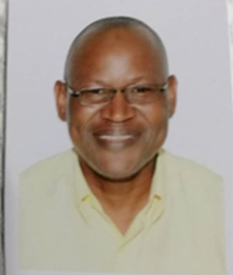By: Morro Krubally, UTG
I would like to begin this piece with a quote: “Small disciplines repeated consistently everyday lead to great achievements gained slowly over time” John Maxwell
Gambia’s woes of recent; road accidents, an industrial area fire outbreak, and the lawlessness of our people are primarily as a result of indiscipline. It goes without saying that we are now suffering from the effects of the draconian rule of the Jammeh era.
Jammeh took our law books and trampled on them to tatters. Going by the most recent revelations at the TRRC, some people were given carte blanche to carry out inhumane treatment on their fellow countrymen and women. Some of us suffered inhumane treatment in the hands of people with a severe defective moral compass; all thanks to a rudderless leader of the most despicable character in human history, Yaya Jammeh the monster.
For two decades the Gambia was presided over by one man’s law and not laws based on common sense and consensus. In our new democracy, the law of the land appears not to be worth the paper it is printed on because a number of people are still not sure what it means to be law-abiding in a democracy. For the last two decades, the Gambia was ruled by senselessness that has clouded our sensibility as a nation.
Respecting the law is borne out of discipline, lack of it is borne out of gross indiscipline. Until we raise our level of discipline; our respect for the law of the land, our regard for the fellow man, our desire and respect for orderliness, our respect for systems and standards, our respect for rules and regulations, etc, until such a time, we shall remain a country frozen in time of lawlessness that borders on anarchy. Yaya Jammeh has nearly taken our humanity away but for the mercy of God.
The road accidents of late, and the most devastating industrial fire outbreak; causing the biggest financial destruction in the Gambia of a magnitude never before recorded in Gambia’s recent history is not but a simple reflection of our lack of discipline. Preliminary reports alluded to losses of in excess of D100 million and counting as a result of the industrial fire at Kanifing. Over several hundred people lost their job which deductively translates to several families losing their means of livelihood.
The economic repercussion is not only limited to businesses and employees but reverberates to the municipal and central governments. The tax revenues collected from these affected businesses and their employees will no longer be forthcoming to the local and central governments; financial devastation suffered at a time when the country is limping along economically.
Additionally, the business supply chain will also feel a devastating blow causing serious shortages of goods and services, to say the least, as businesses are interconnected by means of a supply chain. Ultimately, the whole country is affected by this fire accident in one way or the other; a consequential outcome of a disaster of a magnitude never before seen in The Gambia. While we await the findings of the investigation to the cause of the industrial fire in the Kanifing industrial area, I will not hesitate to speculate that the findings may suggest a certain measure of human negligence.
Preliminary statements alluding to the cause of the fire have suggested a gas leak at the Hadim Gas Company that was a priori reported but was not addressed. This might have also been speculated. We shall wait for the official report.
The level of indiscipline is pervasive and entrenched in our society. It is not lost on anyone the kinds of unacceptable behaviors you will witness whether it is in traffic on the roads, and in our public spaces across town. Most evident of the gross indiscipline is the violation of traffic rules by our public transport “Gelegele” drivers. The drivers are in an endless hurry, driving at breakneck speed in helter-skelter gross violation of traffic rules.
These drivers will never recognize stop signs, they will never yield to incoming traffic, and surely do not even respect the right of way of pedestrians. The most recent development is in the failure of “gelegele” drivers and taxis to follow traffic queue in a traffic jam or even a light hold up, these drivers will simply drive on the shoulder of the road cutting into the queue while causing further damage to already battered roads.
Almost invariably you will witness on any given day a willful violation of traffic rules in the Gambia. One has to be completely devoid of discipline to act in such an unlawful manner. Sadly, this is a common occurrence on the roads in the Gambia of today. Driving in the Gambia is a nightmarish experience on any given day. Pointedly, this writer has witnessed time and again the violation of one-way traffic on Russel Street.
The market front street is by ordinance a one-way street from Banjul Market to all the way past GRA on wellington street to the ferry terminal to the junction of Cotton Street. This street has now been illegally turned to a two-way street by taxis and sadly even by private drivers. Now and again motorist will violate this traffic rule with impunity.
Even the policemen stationed at Albert Market (Banjul Central Market) have proven with futility to enforce traffic and parking rules around the market and the vicinity. On any given day, motorcycle and bicycle riders will ride against traffic on the wrong side of the road with impunity. Time and again pushcarts will push on against traffic and you can only watch in awe wonder whether indeed this was “Animal Farm” in real- The legendary author of the master piece, George Orwell might have adapted his book from the scenes in the Gambia.
For lack of a better adjective, even the zoo is more organized than the traffic in the Gambia. Cumulatively, all these traffic irregularities are a case of indiscipline; God forbids, a disaster waiting to happen.
In a span of three months, Gambia has witnessed three to four devastatingly fatal auto accidents on trans Gambia. For the fatal road accident that involved the Gambia Transport Service bus, and the orange min-bus (gelegele) on trans Gambia, I refer the reader to the published accident scene pictures. In view of the pictures, one will notice that the accident occurred in an area of the road with a solid dividing white line separating the two opposite lanes. It was alleged that the minibus had attempted to overtake a vehicle at which point the oncoming bus from the opposite direction was hit head-on.
This writer has severally driven on trans Gambia going east to Basse and back. I have observed severally that many of these “geleglele” drivers will overtake/pass indiscriminately at any given point on the road without regard to a solid dividing white line or broken dividing white lines.
Those who are knowledgeable about traffic rules, know that a solid dividing white line on a truck road signifies prohibition of overtaking (passing) in that part of the road until a broken white line is obtained. Often this is depicted by a traffic signboard of no passing.
This is simply for safety purposes. Here, ignorance (inexcusable) and indiscipline are often the cause of accidents. Sometimes one cannot help but wonder how some drivers in the Gambia got their license. Rightfully earning a driver’s license is an exception to the rule in the Gambia.
I would venture to say that 60 plus/minus of Gambian “gelegele” drivers did not obtain their license on merit because they lack knowledge of basic traffic rules 101. With increased number of, vehicles on our roads and steady growth of this number, warrant the authorities to start thinking about a strong highway patrol unit for our roads in the Gambia. The time has come for a serious speed and traffic control unit in Gambia. This matter should be studied for feasibility. We should consider budgetary provisions along with an act of parliament to set up this unit of the security sector.
As a native of Basse, URR this writer has observed lawlessness in the proliferation of motorcycle taxis in Basse. For those who are familiar with Senegal’s motorcycle taxi, you will understand the gist of my point. This business, if you will, has now been imported to Basse URR. The law of the Gambia does not allow the use of motorcycles for the purposes of generating an income as a form of public transportation.
There is a progressive burgeoning rise of this illegal industry which is wreaking havoc on the legal taxi industry; taking away business from the taxpaying conventional taxi industry. These motorcycles are often not registered and carry no number plates.
The riders pay no road tax or duty and pay no tax on income. Moreover, these motorcycle taxis have been found to be a conduit for facilitating prostitution and criminality across the border into Senegal. Separate from increasing traffic congestion on Basse’s thoroughfare, these motorcycles have also increased noise pollution in Basse.
According to statistics obtained from those on the ground, most accidents on the roads in Basse involves this motorcycles taxis. Most of these motorcycles will crisscross the Senegal/Gambia border through the back roads without going through customs ferrying passengers and other contraband.
Here again, the police have not been able to ebb or totally obliterate this unlawful industry. This writer personally visited the Inspector General of Police (IGP) as a concerned citizen to seek for a solution. The IGP had assured of an action to mitigate the situation.
Worthy of note, these motorcycle taxis are driven by young men. Here again, we register lawlessness being confused with civil liberties; democracy. Where we want to encourage job creation for our youth, we do not imply that they must engage in lawlessness for a means to an end. In the interest of public safety and orderliness, this industry should first be legalized and then regulated for public safety. We cannot allow impunity to reign in our country as we struggle to rebuild our nation anew.
As a society, we must insist on rules and regulations to be respected/enforced. The Gambia as a society does not do a good job of enforcing rules. The Gambia as a society does not do a good job of enforcing regulations for public or private enterprises.
The Gambia as a society does do a good job of monitoring public-safety standards for adherence to and by the affected industries. I would be curious to find out when was the last time the fire department inspected Hadim Gas Company and other similar companies to ensure safety practices are implemented and updated.
I would be curious to know when was the last time other dangerous material handling companies were inspected to ensure adherence to and respect for safety standards.
Until we begin to avoid complacency, as a country we will pay a heavy price for the same. As a society, we are sleeping at the wheel of a progressive and organized state-building endeavor. This really has been the trajectory for the last 20 years of misrule of the Jammeh era. We hope we can pull out of our slumber for effective nation-building.
For public safety, the government should now consider mandating all industrial facilities, major buildings private or public installing fire extinguishers. All business that employs more than 5-10 employees should be mandated to install fire extinguishers, and all employees must be trained and certified on their use. Henceforth, new building codes should mandate installing sprinklers in industrial and public facilities.
Of course this requires we improve and maintain a steady and dependable water supply system. As we speak the domestic water supply system is marred with a myriad of challenges. We are hopeful that NAWEC’s new leadership will make a difference of a lifetime. These suggestions may be viable only if we can as a country ensure a steady supply of water in our country.
If we are to rise from the ashes of devastation of the last two decades, we really have to work hard. We must all begin to preach discipline, insist on discipline in all facets of life, at work, at home, in private and in public, and tirelessly beat the drums of discipline as we build our nation from the doldrums of the draconian rule of the last two decades.
There should be zero tolerance for indiscipline. We should ensure that we speak up and if necessary self-police by reporting to the authorities wherever and whenever the law is broken. Indiscipline is never little and is one of the biggest enemies of the Gambia.
Gambia must choose, and really, I leave you with this question, Has Gambia Really Decided? God bless the Gambia!! Finally, I would like to end with this quote: “Everyone must choose one of the two pains: the pain of discipline or the pain of regret” Jim Rohn





